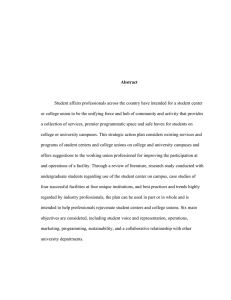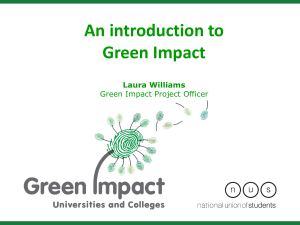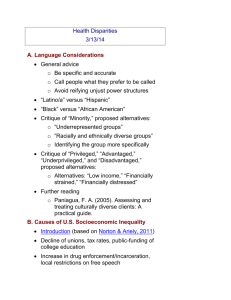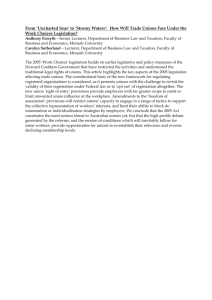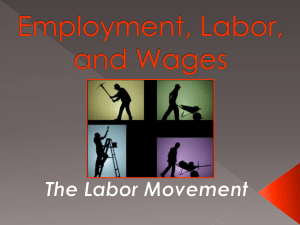AC21 Forum University of Warwick 5 July 2006
advertisement
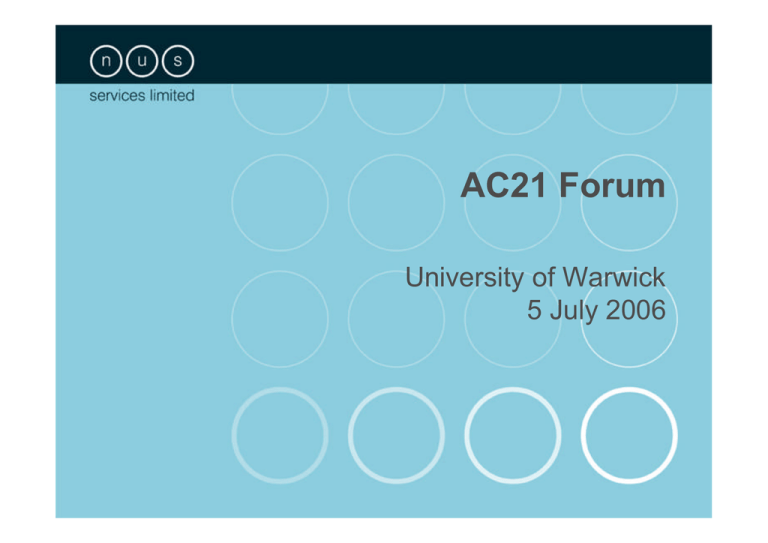
AC21 Forum University of Warwick 5 July 2006 Challenging Orthodoxies Ian King Chief Executive NUS Services Professor Peter Gregson • Universities in the United Kingdom and Ireland must learn to embrace change if they are to compete effectively on the world stage • The 2006 AUA conference comes at a crossroads for higher education in the UK. But the changes and challenges we face present unparalleled opportunities to make our mark on the future Professor Peter Gregson • The University sector in the UK has played a world-leading role for centuries. It has not achieved this without learning to adapt and change Politics & Governance in Students’ Unions Pre 21st Century In the beginning… • NUS started with a small number of ‘old / redbrick’ universities in 1922 • Local Governance was by SRC (Student Representation Council) • Small national conferences • Interrupted by World War II • NUS collection of “gentlemens’ clubs” • Small higher education sector • No politics could be discussed By the early 60’s • We had… – – – – – Robbins report Expansion of higher education Polytechnics CATs (Colleges of advanced technology) New universities By the late 60’s • This happened… – Jack Straw becomes NUS President and constitution changed to enable NUS to have “political debate” – Growth of sabbatical officers – NUS Conference gets bigger (and bigger) – Governance by general meeting – Similar in style to Trade Union mass meeting democracy By the start of the 70’s • We had political radicalism… – Anti-apartheid movement – Women’s Rights – Fascist regimes in parts of Europe / Latin America • Greece • Spain • Portugal – – – – – Soviet Bloc Vietnam War Coup in Chile Democracy movement in Northern Ireland Miners’ strikes to name but a few In the 80’s • Definition of Students’ Unions as charities • 1985 – ultravires payments “definition of what Unions can and cannot spend money on” • End to political donations and payments • 1986 – Education Act – to prevent “no platform policies” In the late 80’s • Late 80s - Numerous attempts to legislate against Students’ Unions, most notably Tim Janman • Switch from General Meetings back to councils (attendance + accountability) • Trade Unions – move to postal balloting • 80s/90s – growth of commercialisation in Unions • Further growth in number of Sabbs and student numbers Into the 90’s • Trade Unions have abandoned mass meetings and mass picketing • Participation in Students’ Union elections cause concern • Charities and “not for profit” examine new methods of governance Into the 90’s • 1994 – Education Act – Great campaigning minimised potential damage to NUS and Students’ Unions but increases… – Institutional scrutiny and responsibility for overview • Falls in volunteerism • Gap in governance scrutiny in many Unions • NUS portrayed by its opponents/denigrators as “out of touch” and unaccountable Into the 90’s • • • • Local Institutional Codes of Practice Participation rates in Unions fall further Election of Labour Government in 1997 Office of the Deputy Prime Minister promote a revolution in management practice and governance in Local Authorities • Various working groups on good practice • Charities Bill, 2005 (Charities Act 2006) • Students’ Unions remain largely unregulated Into the 90’s • Unfettered growth in commercial activity in Students’ Unions • Commercial business becomes a ‘core’ activity • Profits subsidise ‘good causes’ e.g. welfare and representation • Unions become principal service providers to Universities Into the 90’s • 1997 onward – Election of labour government • • • • • • • Introduction of tuition fees (Top Up Fees in 2006) Student numbers at 43% of overall population Radical lifestyle shifts International students ‘Marketisation’ of higher education Students as consumers Huge commercial competition for the Student Pound Quotation • “The basic assumption that customers know best means that, in the best businesses, their decisions drive everything” • “They pass verdicts, moving from product to product and store to store. These judgements send strong feedback” • “Shock might be a better word - forcing changes” Institutional Partnership • • • • • • Redefine core(s) Avoid duplication of services Play to strengths Re-assert role of Union (as locally defined) Revisit unique selling points Unique/important role of the Union – – – – Recruitment of students Retention of students Student experience Student leadership Where now? • • • • • • • Do we lead or follow? Will Unions be forced to regulate? Codes of conduct Simplified governance + accessible systems Benchmark New forms of governance Revisit role of Unions and the role of the Sabbatical Officers as activist/representative and staff as avid servants • Should we be asking our members what they want? Institutional Partnership • Also shared resources combat – Recruitment difficulties – Specialism – Appropriate levels of management So far so good… ……but then along came technology Thesis • “As a consequence of technologies and, other, developments, the world is becoming flat.” • So what I hear you say; what does that have to do with working in Unions? • Please join the journey with me The ten forces that flattened the world The bible tells us that God created the world in six days and on the seventh day he rested. Flattening the world took a little longer. The world has been flattened by the convergence of ten major political events, innovation and companies. None of us has rested since, or maybe ever will again. Triple convergence • The tipping point arrived sometime around the year 2000. • The creation of a global, web-enabled playing field • The sharing of knowledge and work – in real time • Open today to more people in more places on more days in more ways • This is what I mean when I say the world has been flattened! Triple convergence • It is the triple convergence of the new players, and new playing field, developing new processes and habits for horizontal collaboration that I believe is the most important force shaping global economies and politics in the early 21 st century. Giving so many people access to all these tools of collaboration, along with the ability through search engines and the web to access billions of pages of raw information, ensures that the next generation of innovations will come from all over planet Flat. The scale of global community that is soon going to be able to participate in all sorts of discovery and innovation is something the world has simply never seen before. Question? • What has this got to do with Students’ Unions in 2006-2016 The key point • The increasing importance of learning both for individuals and organisations. If we stop learning as individuals or as organisations we will be less relevant and will quickly be left behind. Learning is the new economy. The emerging economies, companies and organisations know this and are placing increasing emphasis and resource into this reality • In our interactions the vertical command and control model is redundant. We should now be working horizontally – connecting, collaborating and facilitating (ring any bells on the governance front?) Start Challenging • Session is meant to get thinking out of the square • Challenging orthodoxies, cutting costs, raising performance and expectations • In short – Fulfil members’ aspirations Questions • If students can order a book from Amazon in ten seconds, can they book a room or a minibus online? • Could your Union operationally collaborate with – – – – University Another Union An external operator An organisation external to the UK Questions • Will the telephone replace the PC as the key item of equipment? • Do students still come onto campus? • What does your Institution intend to do with International students? • Student experience:- Good or bad?reputational issue BBC • The BBC will, like other medial organisations, have to be fleet of foot to capture the attention of a new generation of youngsters who think that email is strictly for old fogies (they use instant messaging instead) and who find it more rewarding to communicate with peers through social websites such as MySpace (70 million users) and Bebo, rather than watch television or read newspapers Coors • Staying in is the new going out? Social Networks • • • • Bebo has 25 million users Growing every day MySpace 80 million users Will virtual communication take over from Students’ Unions and Universities • We must learn to understand the technology and use it to revisit the Students’ Union model – Attractive – Accessible – Modern Good luck • Good luck, I hope this got you thinking! • Recommended read – “Thomas Friedman: The world is flat – The globalised world in the 21st Century” – http://www.amazon.co.uk Key facts • If Wal-Mart was a country it would now be China’s eighth biggest trading partner, ahead of Russia, Australia and Canada • UPS ships 13.5 million packages a day which means that at any given moment, 2% of the world’s GDP is in the back of a UPS truck • When multi-nationals outsource work to developing countries, they typically not only save 75% on wages but also gain 100% increases in productivity Key facts • Advanced fibre optics will soon allow cables to carry 48 terabits of data per second – enough capacity to enable all the printed material in the world to be transformed via a single cable in minutes • One hundred and fifty years ago 90% of Americans worked in agriculture, today the figure is 3% • Google now processes approximately 1 billion searches a day Key facts • Last year, of the 2.8million science degrees awarded around the world, 1.2 million were gained by Asian students in Asian Universities • UPS’s fleet of 270 aircraft make it the 11th largest airline in the world • In China last year BScs in engineering represented 48% of all University degrees. In America it was 5% • eBay now has 105 million registered users from 190 countries trading more than £35 billion of goods annually • My space – 80 million • Bebo – 30 million • • • • • Flick(r) YouTube Google video I Tunes Facebook • I Tunes – Replaced music stores • Amazon – Bookshops • Ebay – Replaced car boot sales • • • • Has this replaced Unions? Will it? What will we do? Will we challenge orthodoxies
